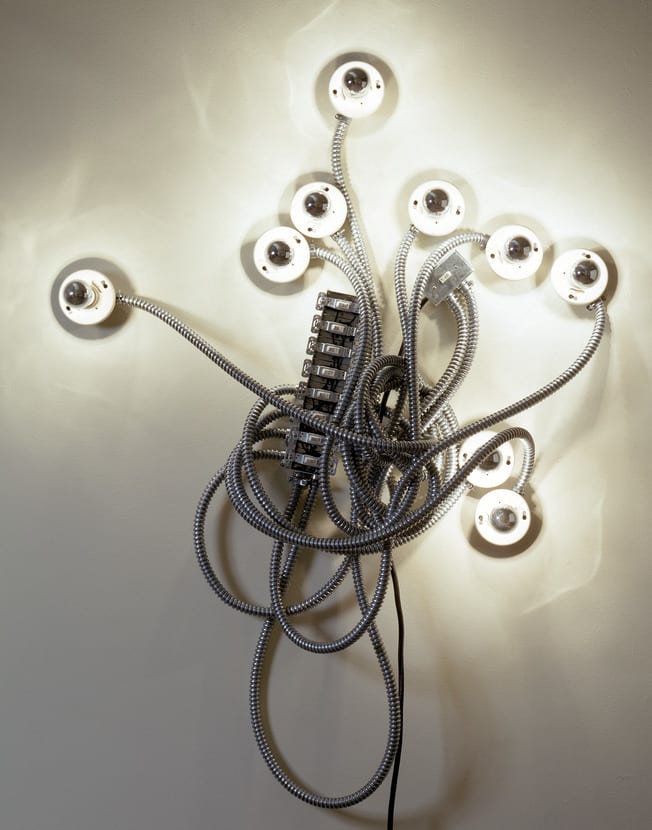
- Artist/Maker:
- Matthew McCaslin
- Bio:
- American, b. 1957
- Title:
- Being the Light
- Place Made:
- New York, United States
- Date:
- 2000
- Medium:
- Light bulbs, porcelain light fixtures, metal electrical conduit, switches, and metal receptacle box
- Dimensions:
- 62 × 44 3/4 × 10 1/2 in. (157.5 × 113.7 × 26.7 cm)
- Credit Line:
- Purchase: Contemporary Judaica Acquisitions Committee Fund and Judaica Acquisitions Fund
- Accession Number:
- 2001-14a-j
Not On View
Since the early 1990s, Matthew McCaslin has created sculptures and site-specific installations featuring industrial electrical materials, clocks, fans, and video monitors. Grounded in the formal and aesthetic strategies of Process Art and Post-Minimalism of the 1960s and 1970s, his work invites the viewer to consider his or her own relationship to technology, nature, and time.
In 2000, McCaslin was invited to participate in Light x Eight, The Jewish Museum's biennial Hanukkah exhibition of works by contemporary artists who use light. Struck by the beauty and diversity of the museum's display of Hanukkah lamps, the artist created a site-specific piece that at once referred to the rich historical tradition of this ceremonial object while reimagining it for the twenty-first century.
McCaslin's signature vocabulary of industrial materials-lightbulbs, switches, and metal electrical conduit-is metaphorically relevant to the holiday. The artist sees industrial electrical hardware as a sublime material that lurks behind our walls, as ubiquitous as it is hidden, connecting us physically, culturally, and spiritually. Seeing the beauty of these industrial forms, the artist literally brings this infrastructure out of hiding "into the light," a most appropriate expression for Hanukkah, the Festival of Lights.
McCaslin's piece-both sculpture and Hanukkah lamp-plays with the combination of formal restriction and openness that he found so intriguing about this ritual object. On the traditional side, Being the Light follows some of the dictates for a Hanukkah lamp's configuration-eight lights, with a ninth acting as the shamash, or servitor, which kindles the other lights. The electrical system devised by the artist also cleverly reflects the traditional lamp: the shamash must be switched on before the other eight bulbs can be illuminated. In a final allusion to tradition, the switches for the eight lights are arranged in a single row, echoing the form of the bench-style Hanukkah lamp.
However, McCaslin also playfully departs from tradition. Notably, the lights are not at a typical uniform height, and turning on the switches in a row actually lights the bulbs nonsequentially rather than in the expected right-to-left order. Finally, at the same time that McCaslin is in dialogue with tradition, he also seems to be nodding at that most contemporary version of the Hanukkah lamp- the electric menorah that has become so popular in recent decades.
In 2000, McCaslin was invited to participate in Light x Eight, The Jewish Museum's biennial Hanukkah exhibition of works by contemporary artists who use light. Struck by the beauty and diversity of the museum's display of Hanukkah lamps, the artist created a site-specific piece that at once referred to the rich historical tradition of this ceremonial object while reimagining it for the twenty-first century.
McCaslin's signature vocabulary of industrial materials-lightbulbs, switches, and metal electrical conduit-is metaphorically relevant to the holiday. The artist sees industrial electrical hardware as a sublime material that lurks behind our walls, as ubiquitous as it is hidden, connecting us physically, culturally, and spiritually. Seeing the beauty of these industrial forms, the artist literally brings this infrastructure out of hiding "into the light," a most appropriate expression for Hanukkah, the Festival of Lights.
McCaslin's piece-both sculpture and Hanukkah lamp-plays with the combination of formal restriction and openness that he found so intriguing about this ritual object. On the traditional side, Being the Light follows some of the dictates for a Hanukkah lamp's configuration-eight lights, with a ninth acting as the shamash, or servitor, which kindles the other lights. The electrical system devised by the artist also cleverly reflects the traditional lamp: the shamash must be switched on before the other eight bulbs can be illuminated. In a final allusion to tradition, the switches for the eight lights are arranged in a single row, echoing the form of the bench-style Hanukkah lamp.
However, McCaslin also playfully departs from tradition. Notably, the lights are not at a typical uniform height, and turning on the switches in a row actually lights the bulbs nonsequentially rather than in the expected right-to-left order. Finally, at the same time that McCaslin is in dialogue with tradition, he also seems to be nodding at that most contemporary version of the Hanukkah lamp- the electric menorah that has become so popular in recent decades.
Information may change as a result of ongoing research.